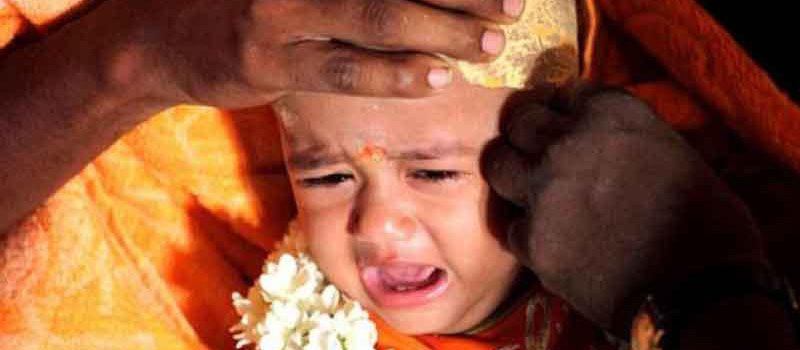Tonsuring & Ear Piercing
Tonsuring is one of the compulsory ceremony in Hinduism. Not only in Hinduism, in earlier days, had Catholics and Jews had the practice of tonsuring. Even today tonsuring is an inevitable practice in Buddhism and Jainism.

Ear piercing, or Karnavedha, is another significant cultural and spiritual practice in Indian history. Ayurveda and traditional Chinese medicine claim that specific earlobe points link to important acupressure sites that assist brain development, improve vision, and maintain general health. It is believed that by balancing the body's energy flow, piercings enhance wellness.
Why is tonsuring done:
According to the vedhas, tonsuring (Chudakarana) should be performed at the first or third year of the infant. It is a wide belief that, by doing tonsuring to the new born baby, its past sins will be removed along with the hair. This hair is donated to Lord or left in the sacred pond.
Some people of India call it as Mundan, and they revere this ceremony greatly. On a very auspicious day, this ceremony takes place. The priest chant mantra for the wellbeing of the child and then the barber shaves the first hair of the baby.
A tuft of the hair is offered to the God and the remaining is washed in the sacred river. The bare head of the child is cover with sandal and turmeric paste, which helps to heal the nicks and cuts, it also keep the body cool.
Grown up men take vow to do tonsuring, in order to please the God and make their wish come true. By doing tonsuring devotees are sacrificing their beauty to the God and they are releasing themselves from vanity. So tonsuring is considered to be the most sacred offering.
Benefits:
Scientifically by doing tonsuring regularly our split hairs and dandruff are cured. It also helps in the growth of healthy hair and makes the scalp receive good sunlight. Tonsuring can also be therapeutic in curing many diseases such as pediculosis and plica polonica.
Places to do Tonsuring:
Tirupati, Varanasi, Palani, Rameshwaram, and Tiruchendur are famous for tonsuring. People also do tonsuring to their family deity (Ayyanar) temple.
Conclusion:
Indian culture is strongly ingrained with toning and ear piercing, which amalgamates social, religious, medical, and spiritual customs. Symbolizing social identity, protection, health advantages, and cleansing, these acts are more than just rituals; they are an essential part of the cultural fabric. Honouring the rich legacy and ongoing cultural life of Indian civilization, they are observed with utmost reverence.